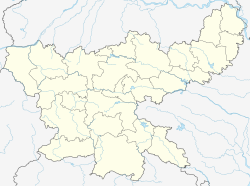|
Patra, Sahibganj
Patra is a census town in the Udhwa CD block in the Rajmahal subdivision of the Sahibganj district in the eastern Indian state of Jharkhand. Geography
15km 10miles R A J
M
A H A L H I L L S B I H
A
R W E S
T
B E N G A L
Dewdanr R
Ganges
Sagarmpur CT
Raghunandanpur CT
Kumarpur CT
Tin Pahar CT
Patra CT
Borio CT
Berhait Santali CT
Berhait Bazar CT
Barharwa CT
Sarauni CT
Mahagama CT
Rajmahal coalfield
Sakrigali H
Moti Jharna H
Teliagarhi H
Bhognadih H
Pakur M
Sahebganj M
Rajmahal M
Godda M
Panchuara R
Pakuria R
Maheshpur R
Litipara R
Hiranpur R
Amrapara R
Udhwa R
Taljhari R
Ranga R
Radhanagar R
Pathna R
Mirzachauki R
Mandro Damin Bazar R
Kotalpokhar R
Sunderpahari R
Rajabhita R
Pathargama R
Parsa R
Motia R
Mehrma R
Lalmatia R
Hanwara R
Dhamri R
Belbadda R
Basantrai R
Poraiyahat R
Bara Boarijore R Cities, towns and locations in the Sahibganj, Godda and Pakur districts in Santhal Pargana Division M: municipality, CT: census town, R: rural/ urban centre, H: historical/ religious/ tourist centre Owing to space constraints in the small map, the actual locations in a larger map may vary slightly LocationPatra is located at 24°58′12″N 87°50′33″E / 24.970078°N 87.842478°E. Patra has an area of 6.26 square kilometres (2.42 sq mi).[1] OverviewThe map shows a hilly area with the Rajmahal hills running from the bank of the Ganges in the extreme north to the south, beyond the area covered by the map into Dumka district. ‘Farakka’ is marked on the map and that is where Farakka Barrage is, just inside West Bengal. Rajmahal coalfield is shown in the map. The area is overwhelmingly rural with only small pockets of urbanisation.[2] Note: The full screen map is interesting. All places marked on the map are linked and you can easily move on to another page of your choice. Enlarge the map to see what else is there – one gets railway links, many more road links and so on. DemographicsAccording to the 2011 Census of India, Patra had a population of 9,536, of which 4,845 (51%) were males and 4,691 (49%) were females. Population in the age range 0–6 years was 2,408. The total number of literate persons in Patra was 3,350 (47.00% of the population over 6 years).[1] InfrastructureAccording to the District Census Handbook 2011, Sahibganj, Patra covered an area of 6.26 km2. Among the civic amenities, it had 10 km roads with open drains, the protected water supply involved hand pump, uncovered well. It had 141 domestic electric connections. Among the educational facilities it had 2 primary schools, 1 middle school, 2 secondary schools, 2 senior secondary schools. It had the branch offices of 1 nationalised bank, 1 cooperative bank.[3] References
|
||||||||||||||||||||||||||||||||||||||||


